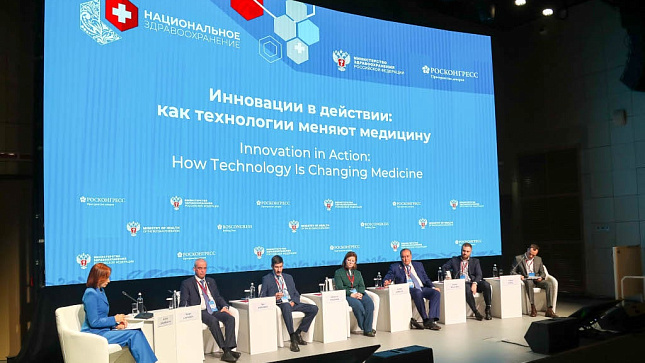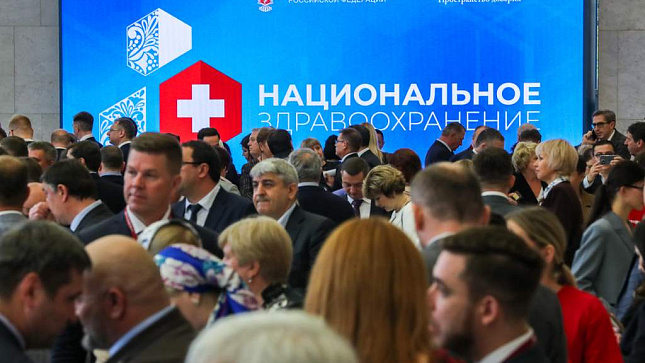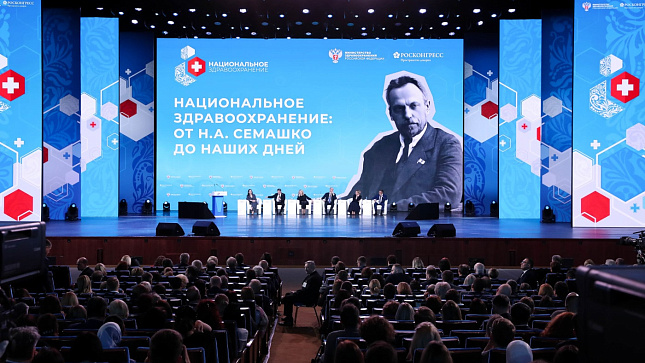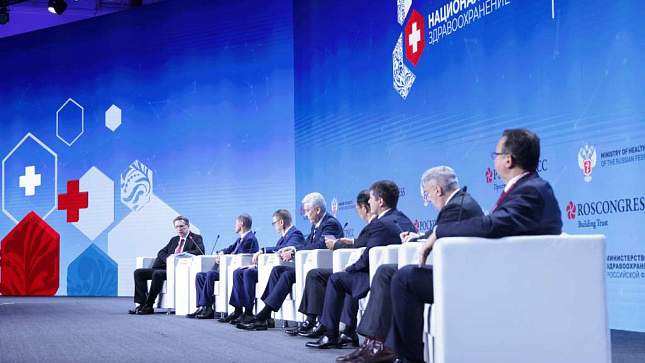
NATIONAL
HEALTHCARE 2025
NATIONAL HEALTHCARE 2023 Congress Presents Achievements in Russian Healthcare Industry
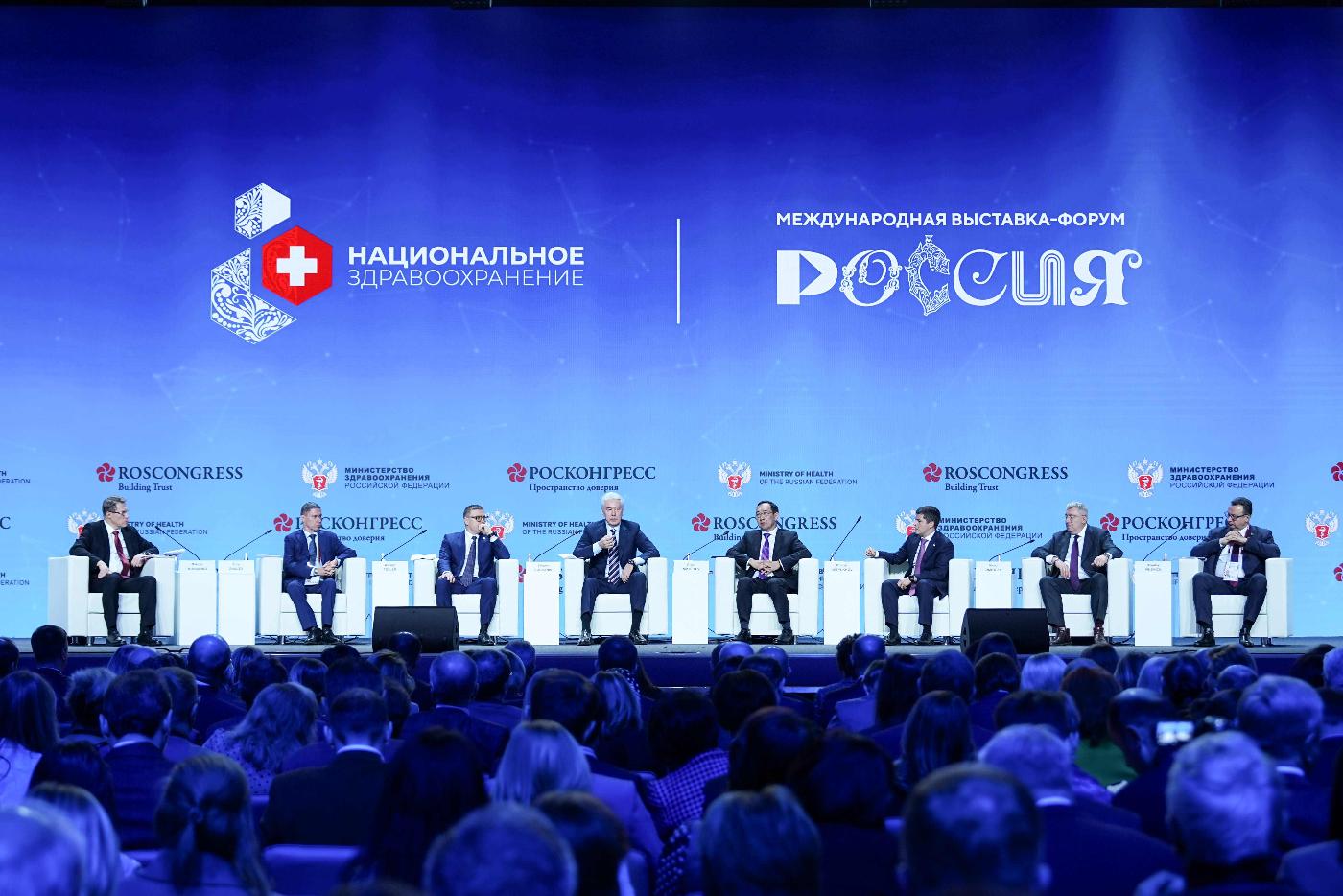
The 2nd National Congress with international participation “NATIONAL HEALTHCARE” was attended by more than 200 leading industry experts, roughly 4,000 participants, representatives of 89 Russian regions, and participants from 14 countries. The Congress took place on 1–2 December in Moscow at the International RUSSIA EXPO. It was the flagship event of the year in the domestic healthcare industry and provided an opportunity for an open dialogue among experts about the most pressing issues in the industry. The Congress was organized by the Russian Ministry of Health and the Roscongress Foundation. The organizing partner was the Russian Research Institute of Health of the Russian Ministry of Health.
The opening ceremony of the Congress was attended by Russian Deputy Prime Minister Tatyana Golikova, Federation Council Deputy Speaker Inna Svyatenko, State Duma Deputy Chair Anna Kuznetsova, and Russian Minister of Health Mikhail Murashko.
The participants in the plenary session included: Yamal-Nenets Autonomous District Governor Dmitry Artyukhov, Head of the Republic of Sakha (Yakutia) Aysen Nikolayev, Moscow Mayor Sergey Sobyanin, Chelyabinsk Region Governor Alexey Teksler, Co-Chairman of the All-Russian Union of Patients Yury Zhulev, General Director of the Association of Russian Pharmaceutical Manufacturers Viktor Dmitriev, and Belarusian Minister of Health Dmitry Pinevich.
The Congress is becoming an annual event: for the second time, it brought together representatives of the federal and regional authorities, the medical and scientific community, non-commercial organizations and businesses, foreign partners, and experts, with a total of roughly 4,000 participants.
The Congress mainly took place in the format of expert sessions. The discussions focused on some of the most pressing issues in the current stage of the Russian healthcare industry: state support, the introduction of innovative developments into clinical practice, the digital transformation of the industry, import substitution, the evolution of the domestic production of essential medicines, the country’s safety against infections, progress in the fight against non-communicable diseases, and the development of human resources for the industry.
One of the key sessions – ‘Breakthrough Healthcare Technologies in the Russian Federation’ was moderated by Russian Minister of Health Mikhail Murashko. Other expert sessions were hosted by deputy ministers and heads of related agencies. The plenary session ‘Medicine and Quality’ was co-organized by the Russian Federal Service for Surveillance in Healthcare, while the session ‘The Role of Healthcare in the Long-Term Care System’ was co-organized by the Russian Ministry of Labour and Social Protection. The special session ‘Organization of the Domestic Production of Blood Products as a Contribution to Ensuring the Security of the National Healthcare System’ was organized jointly with the Russian Federal Medical-Biological Agency. The Congress concluded with a lecture by Russian Minister of Health Mikhail Murashko titled ‘Healthcare Development in the Russian Federation: Past, Present, Future’.
Four sessions of the NATIONAL HEALTHCARE 2023 Congress became part of the educational programme of the International RUSSIA EXPO, whose general partner was the Russian Znanie Society.
The minister of health held a meeting on the sidelines of the Congress with regional ministers of health, as well as a meeting with business associations and pharmaceutical companies that focused on the development of measures to support innovative companies.
The Congress business programme included the visiting lounge of the Eurasian Women’s Forum ‘Women for a Healthy Society’. The challenges of our times and the growing human need to improve the quality of life dictate the importance of the agenda for preserving the health of the Russian population and the development of health protection practices, as well as pharmaceutical innovations. Considering that more than 83% of representatives of the medical and pharmaceutical industries are women, they play a key role in the rapidly developing Russian healthcare system as they introduce and promote the latest technologies in healthcare. The meeting was moderated by Chairwoman of the Council of the Eurasian Women’s Forum and First Deputy Chair of the Federation Council’s Committee on Federal Structure, Regional Policy, Local Government, and Northern Affairs Galina Karelova. The meeting was also attended by Anastasia Stolkova, director of the Roscongress Foundation’s Healthcare Directorate and head of the Women for a Healthy Society project.
Awards were presented on the sidelines of the Congress to the winners of Russian professional competitions, including the country’s best doctors and health workers, as well as the best young teachers at medical universities. In addition, on the day before the Congress, participants had a chance to take a tour of leading federal centres and research institutes, including the Vishnevsky National Medical Research Centre of Surgery, Herzen Moscow Oncology Research Institute, and other leading medical institutions in Moscow.
Common themes throughout the Congress were an increase in life expectancy, a focus on the patient, the use of breakthrough technologies, the importance of training and attracting qualified personnel, as well as the shift in medicine towards the use of new domestic developments (drugs and equipment).
Key indicators of the Russian healthcare sector have improved significantly in recent years. In particular, around 60% of malignant neoplasms are diagnosed at stages 1–2, which makes the treatment prognosis as favourable as possible. Infant mortality in Russia reached an all-time low in 2022 and continues to decline. The current rate is 4.1 per 1,000 births, which is lower than in a number of developed countries.
One recent trend in healthcare is the use of artificial intelligence, which helps in forecasting, diagnosing, and making medical decisions based on extensive sets of patient data. Regional healthcare systems are tasked with introducing at least one artificial intelligence-based solution by the end of the year in a centralized manner. Russian AI-based platform solutions, new revolutionary drugs, and the therapeutic approaches of Russian doctors were presented at the Congress.
Specifically, scientists from the Pirogov Russian National Research Medical University, together with the company Biocad, developed a first-class drug for the treatment of ankylosing spondylitis that targets a small group of cells. In 2024, the National Medical Research Centre for Haematology will begin clinical trials of the first Russian CAR-T drug for the treatment of oncohematological diseases.
The Kulakov National Medical Research Centre for Obstetrics, Gynaecology, and Perinatology conducted a pilot project to study the exome for the diagnosis of roughly 2,000 monogenic diseases and found three new genes that had not previously been associated with monogenic diseases, thus making a substantial contribution to world medicine. Scientists from the Federal Centre for Brain and Neurotechnology of the Russian Federal Medical-Biological Agency, together with the Rostec Corporation, have created a mobile device for surgery with focused ultrasound, which makes it possible to remove lesions in any layer of the brain.
The discussions focused on the need to make cutting-edge developments accessible and incorporate them into healthcare institutions across the country wherever possible. This will contribute to achieving Russia’s national growth targets.
“Probably like the majority of people in this room, I have got a strong feeling that we are really moving in the right direction. Today, we have something to be proud of in the domestic healthcare system, but there are also problematic areas that need to be addressed and improved. The tasks that we discussed must be implemented when forming a new package of national projects,” Minister of Health Mikhail Murashko said in the final assembly lecture at the Congress.
